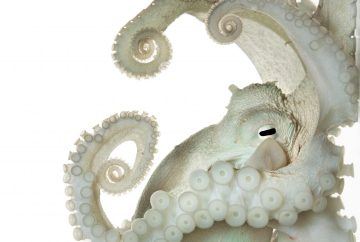by Leanne Ogasawara

Anyone who has ever found themselves caught in a staring contest with an octopus –those soulful cat-eyes returning your gaze through the thick glass of an aquarium tank– can attest to the uncanny power these creatures exert over our human imagination.
They certainly look alien. With three hearts pumping blue, copper-infused blood, their tentacles (“each with a mind of its own”) are covered in suckers that can feel AND taste. Because their beaks are the only hard parts of their bodies, a large octopus can squeeze through a hole not much bigger than one of their eyeballs. They are like the Great Houdinis of the deep! Without a hard shell like other mollusks, octopuses have evolved clever ways for keeping a step ahead of predators: Not only can they change colors to camouflage themselves, blending into almost any watery environment, but they can also send out ink bombs. After lobbing one to confuse an enemy, an octopus can jet propel away from danger at surprising speeds in a funnel of water.
Is it any wonder that there have been people who believe they might have originated in space? From the Scandinavian myth of the Kraken and Jules Vernes’ 20,000 Leagues Under the Sea, to Japanese sea monsters and the sexual predators found in erotic shunga prints, again and again–in so many cultures around the world– these creatures show up in stories and art as monsters and space aliens. And who could forget the fear instilled in the losing soccer teams by Paul the Clairvoyant World Cup Octopus? The Argentines got so angry at him that they threatened to kill him and cook him in a paella, if he kept foretelling their bad luck!
My own personal octopus “horror” is the not-as-rare-as–you-would-think sight of Japanese TV personalities (and a few of my friends) traveling in Korea and eating live octopuses–desperate tentacles clawing their way out of the people’s mouths! Read more »

